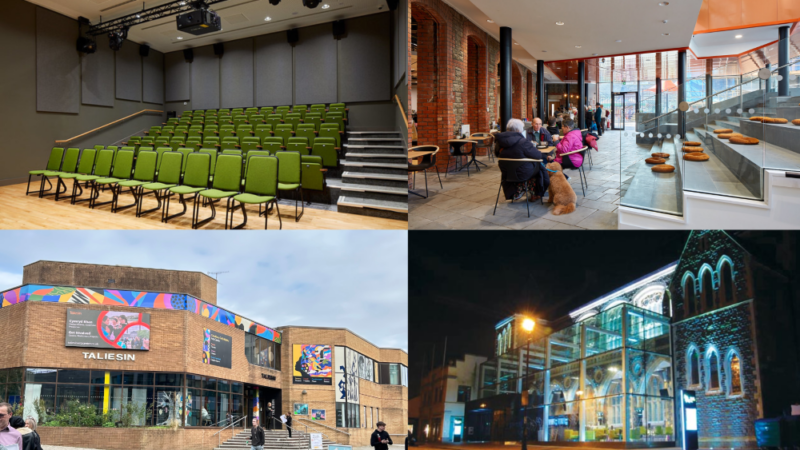
Too Much – Melodrama on Film: a UK-wide season
27th August 2025
The BFI announces TOO MUCH – Melodrama on Film – a new season celebrating the vivid visual language, heightened dramatics and emotional pathos at the heart of film melodrama, inviting film audiences to follow their emotions. United by their emotion driven plots, vivid visual language and self-conscious audience manipulation, these films are designed to make you break down in tears, cause a scene, fall in love, feel something. Presented by the BFI at BFI Southbank and BFI IMAX and by the BFI Film Audience Network (BFI FAN) using funds from the National Lottery at cinemas and venues across the UK, TOO MUCH will take place from October- December 2025 via programmes of special events, talks and screenings. TOO MUCH will also be available UK-wide online via a curated collection of films available to stream on demand on BFI Player.
The season will explore the world of melodrama through the ages, with films ranging from cult classics to lesser-known international gems. Melodrama is steeped in contradiction. Swooningly romantic, people fall in love at first sight, sacrifice their lives in acts of devotion, find one another across space and time. Simultaneously they are grounded in the trappings of reality: rigid class boundaries, threat of punishment, and fear of scandal loom at every corner. The characters in these films are culturally diverse, from different generations and social backgrounds, but endlessly human and relatable. Their stories shed light on injustice and oppression.

Whilst expansive in its reach and impact across all genres of cinema, melodrama has long been associated with its rare embrace of women’s inner lives and concerns. This expansive drama is employed to express longing, rage and desire in characters facing motherhood, infidelity, exploitation and scandal. The legacy of early ‘women’s pictures’, created for female audiences with their favourite female stars, echoes across generations and around the world. As in life, these women do not always triumph. Imperfectly feminist yet endlessly empathetic, their sensationalist struggles carry searing social commentary beneath the glossy veneer of attention-grabbing colours, lurid plotlines and sentiment.
Accessible but ripe for dissection and reappraisal, while melodrama may lack the recognition of a genre like horror or action, TOO MUCH aims to illuminate melodrama as a key cinematic form, banish the stigma attached to the term, and spotlight how it has created masterpieces of world cinema.
From the early days of cinema and the evolution of the ‘women’s pictures’ of the 1930s and female film stars such as Joan Crawford, Bette Davis, Barbara Stanwyck and Claudette Colbert, cult classics and underseen gems, through to work from some of contemporary cinema’s biggest names such as Todd Haynes FAR FROM HEAVEN (2002), Pedro Almodóvar VOLVER (2006), Lars von Trier BREAKING THE WAVES (1996) as well as masterpieces of world cinema. The season will feature screenings of 7 TH HEAVEN (1927, Frank Borzage), IMITATION OF LIFE (1934, John M. Stahl), STELLA DALLAS (1937, King Vidor), NOW VOYAGER (1942, Irving Rapper) BRIEF ENCOUNTER (1945, David Lean), THE LIFE OF OHARU (1952, Kenji Mizoguchi) ÉL (1953, Luis Buñuel), JOHNNY GUITAR (1954, Nicholas Ray), LOLA MONTES (1955, Max Ophüls), STELLA (1955, Michael Cacoyannis) THE CLOUD-CAPPED STAR (1960, Ritwik Ghatak) THE ARCH (1968, T’ang Tsu Shuen), THE BITTER TEARS OF PETRA VON KANT (1972, Rainer Werner Fassbinder), THE SILENCES OF THE PALACE (1994, Moufida Tatli) and many more.
A centrepiece of TOO MUCH will be Douglas Sirk’s colourful, high-octane love story ALL THAT HEAVEN ALLOWS (1955) which will return to cinemas UK-wide on 24 October, courtesy of Park Circus. Jane Wyman and Rock Hudson entrance as the star-crossed lovers at the centre of Sirk’s transgressive, saturated portrait of 1950s Eisenhower-era Americana, class friction and moral values.
Ruby McGuigan, BFI Programme Development Manager and TOO MUCH BFI Southbank season curator, said:
“A story’s emotional heart is what brings us back to it time and time again and allows it to translate across generations and cultures. Melodrama – an embrace of emotion above all – is the lifeblood of great cinema, across decades and geographic borders. Melodrama has always revelled in the squashing of emotions too volatile for everyday life, and the inevitable explosion under pressure. As a young woman discovering these films, I felt understood. Perhaps I wasn’t insane, or ‘too much’. Perhaps life is just overwhelming sometimes. In recent years we’ve finally seeing women’s emotional worlds take centre stage in literature, music and television – there’s a legacy of this in cinema which I believe is often overlooked. I’m so excited to share and discuss with audiences how these films make us feel today, and how these bold stories of melodrama’s heroines have driven some of world cinema’s timeless masterpieces. Don’t forget to pack your tissues.”
The season will be programmed around key themes, Love featuring star-crossed lovers, sacrificial acts of devotion, connections across space and time and melodrama as romance incarnate, Obsession brimming with tales of unrequited love, impossible desires and toxic jealousy, Duty stories of maternal sacrifice, marital constraints and dreams denied simmering beneath the serene surface of family life. Defiance showcasing rebellion in all its forms, both righteous and frivolous, regardless of the consequences, Scandal featuring tales of melodrama’s tragic heroines, who fall victim to its judgmental gaze. Melodrama’s most expressionistic, sumptuous films will also screen at BFI IMAX.
The full UK-wide line-up of screenings, events and touring programmes will be announced soon via bfi.org.uk/too-much

BFI Southbank will play host to a major season from 20 October – 30 December, focusing on the strong cross cultural appeal of melodrama, including titles from Greece, Egypt, China, Hong Kong, Japan, India, Tunisia, Italy, Spain, Germany, Denmark, Mexico, Argentina, Russia curated under the five thematic pillars of Love, Obsession, Duty, Defiance and Scandal. BFI IMAX, the UK’s biggest screen, will play host to some of melodrama’s most expressive films, FAREWELL MY CONCUBINE (1993 Chen Kaige), DEVDAS (2002, Sanjay Leela Bhansali) and WRITTEN ON THE WIND (1956, Douglas Sirk). Special events celebrating the expansive melodrama genre will include a keynote introduction with leading academic and author Laura Mulvey and a special day of playful panels and presentations – Melo-dramarama, an immersive day delving into the labyrinth of themes, tropes and quirks of melodrama beyond women on screen, from its embrace by queer audiences to male weepies and soap operas.
Audiences will also be able to stream films from the season at home on BFI Player, with a selection of 20+ curated titles set to include, BODY AND SOUL (1925, Oscar Micheaux), CRAIG’S WIFE (1936, Dorothy Arzner), THE RECKLESS MOMENT (1949, Max Ophüls), VICTIMS OF SIN (1951, Emilio Fernández), CAIRO STATION (1958, Youssef Chahine), RED ANGEL (1966, Yasuzo Masumura), MORGIANA (1972, Juraj Herz), BROKEBACK MOUNTAIN (2005, Ang Lee), PORTRAIT OF A LADY ON FIRE (2019, Céline Sciamma) and THE DAMNED DON’T CRY (2022, Fyzal Boulifa).
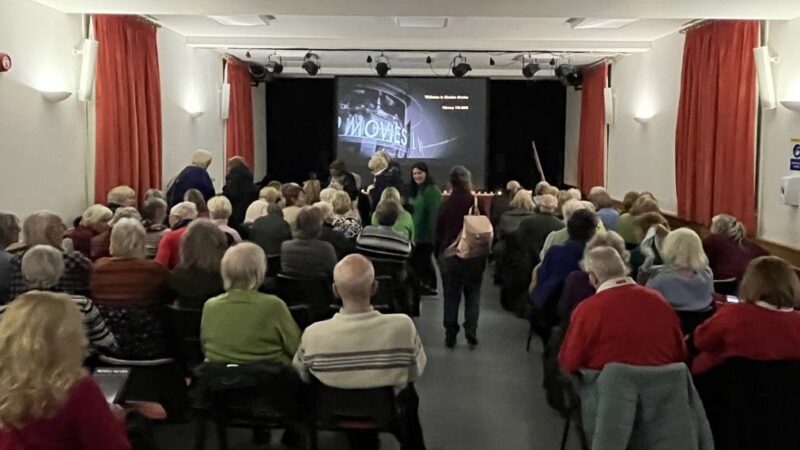
Monico Movies to screen its final film in July 2025
After 10 hugely successful years, the final curtain will soon fall on much loved community cinema Monico Movies.
In 2015, a group of local movie enthusiasts were invited by filmmakers Viv and Harley Jones to discuss the idea of opening a community cinema, screening a variety of films. Rhiwbina Community Cinema – a not for profit, volunteer led cinema – was born. It was named Monico Movies as a tribute to the much missed local cinema ‘The Monico’ which opened in Rhiwbina in 1936 and closed in 2003.
Monico Movies started from scratch with no equipment. However, screening films was initially made possible through the loan of equipment from Film Hub Wales and, after the first year as a community cinema group, funding was secured from the Big Lottery to buy a projector and screen.
Monico Movies hosted its first screening, The Grand Budapest Hotel, in October 2015 at Canolfan Beulah. Since then, shows have been held on the 2nd Saturday of each month for ten years. More than 200 films have been screened, attracting a loyal audience, with up to 80 people attending
each month. Five local shops – Serenade, Victoria Fearn Gallery, Ginger Whites, Deri Stores and the Honey Pot – have also supported Monico Movies, by selling tickets. This continued support by the audience and ticket outlets has ensured the community cinema’s ongoing success.
In volunteering to plan and host an annual film programme, the dedicated crew have contributed time and skills, including web and poster design, social media publicity, film research, administration and projection. The volunteer group curated a varied programme across a range of different film genres. These included world cinema, independent films, old favourites, forgotten classics and new releases. One memorable highlight was screening Buster Keaton’s silent movie, The General, with live piano accompaniment. Monico Movies has also been proud to showcase local film makers.
Monico Movies revived the tradition of a regular, local cinema experience for the community in Rhiwbina. Having achieved the milestone of 10 years, the group members have decided the time is right to retire – to hang up the film reels, put away the usherette’s tray and dim the lights one last time.
The final Monico Movies show will take place at 7.30pm on Saturday 12th July 2025, when the Welsh made film ‘Mr Burton’, about the early life of actor Richard Burton, will be screened and the audience of Monico Movies will celebrate their love of cinema one last time.
Contact: Harley Jones
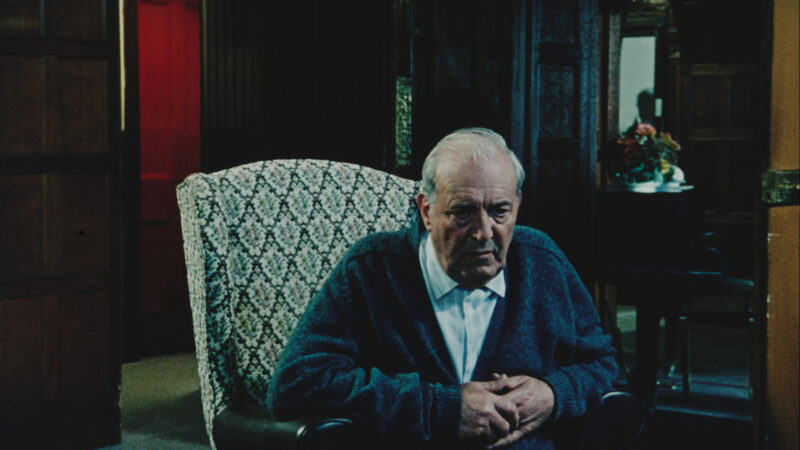
Do Not Go Gentle: On the Welsh Class-Politics of Care
Diffwys Criafol is the pen-name of a Cardiff based writer with a deep interest in social class. The themes around her work centre around this subject usually in relation to her own life experience. Find her on Linktree / Instagram
Translated into Welsh by Mair Lannen
“[Welsh culture is] a post-colonial culture, conscious all the time of its own real strengths and potentials, longing to only be itself, to become its own world but with much, too much on its back to be able, consistently, to face its real future” – Daniel Williams on Raymond Williams work in the introduction of ‘Who Speaks for Wales’ 2008
This is a film reckoning not only with the story of one family, but with the dizzying speed of change that has occurred in Wales over the 20th century. Haunted by the past, bewildered by the present and looking to the future with a careful hope.

“Do not go Gentle” was released in 2001 but was set in the period running up to the 1997 UK general election – the climax of the film coinciding with the election results night when “New” Labour won after 16 years of Tory rule. However, this is not just a historic-political film, or a film about the problems of aging in an increasingly individualistic neoliberal society. It goes much deeper. Its portrayal of the family dynamic, speaks to the fundamentals of our psychology as a colonised people. Torn between assimilation into joining and participating in a system of impersonal brutality versus the counter struggle to this – the impulse to hold on to our culture, language, class and place.
For me, the characters are an allegory of the class tensions and directions in the context of Welsh speaking Wales – known in Welsh as ‘Y Fro Gymraeg’. William Davies, the Father, appears to have Alzheimer’s disease and needs to be looked after – but who is going to take responsibility for his care? William Davies, a former quarryman and Elder (Blaenor) in the Chapel is a classic depiction of the traditional Welsh working class man of the 20th Century.
The ensuing conflict between his children on the subject of William’s care becomes a personification of the class tension arising from fluctuating class mobility in families. The eldest son – John Meredydd – who is upwardly socially mobile, Maureen – a single mother, meanwhile, is relegated downwards. Alun Cledwyn, the third sibling is at a crossroads, struggling to hold on to the middle class life he has built while contending with his chronic illness of alcoholism.
John Meredydd, who has physically and mentally distanced himself from the family to make his fortune, now looks down upon his (working class) family with disdain. Maureen is expected to do the unpaid caring labour, raising her three children alone and juggling two jobs. Alun Cledwyn is torn between ‘Y Fro Gymraeg’ and the world, his middle-class aspirations in contradiction to his connection to home, his ‘etifeddiaeth’. The amalgamation of land, community, language, family and Welshness itself – at one point in the film described as a noose around his neck. These are the contradictions of Welshness distilled to its clearest form.
This film also skillfully depicts the human consequences of the privatisation of care. We bear witness to how such state policies rob individuals and their families of their dignity in the last months of life.
The title of this film in Welsh is “Oed yr Addewid” which literally means “The Promised Age”. In Welsh language culture (but originating from the Bible) this saying means that we are “only promised to live to 70” – everything after that is just a bonus apparently! The opening of the film is Willam’s 70th birthday. It feels significant to me that since this film was first released, these precious few years of retirement before our “promised time” is now spent working. Since the Millenium, the one sided class war against us has gone into overdrive. We can no longer expect to look forward to a few years of rest and family time in retirement while we still have their health. Now, many people (my own father being one of them) are working physically demanding jobs well into their 70’s while contending with a range of health conditions.
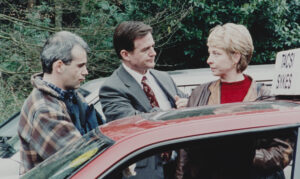
The depictions of class throughout the film are beautifully thoughtful and nuanced. This is a rare cultural artifact that I feel succeeds in honoring the complexity of class in the Welsh speaking context. This is especially interesting today after what feels like an age of endless austerity since the 2008 crash that has plunged 22% of adults and a third of children into poverty in Wales, with much of this concentrated in the Welsh speaking heartlands.
This is a film that has retained its relevance to our contemporary lives. The simultaneous crises co-occurring within one family, their relationships to one another, and its bravery in dealing with subjects that many of us would frankly rather not face. Death, insanity, class, identity, the loss of meaning. The intensity and existential angst of Welsh speaking communities. Addiction, gender roles and how we treat our elderly are all themes raised in this film. There are plenty of challenging subjects, however, for me, it felt cathartic to watch.
The film is imbued with a sense of determined hope, the dark humour and sharp working class wit in the dialogue helps carry the heavy themes. This was genuinely one the best films I have watched in a long time in any language. Its release is timely – we need to face the issues raised in this film on individual and collective levels now more than ever.
A new scan of Oed Yr Addewid is coming to cinemas in 2025 from The National Library of Wales Screen and Sound Archive in partnership with Film Hub Wales.
This article was commissioned by Film Hub Wales as part of our Made in Wales strategy, which celebrates films with Welsh connections, thanks to funding from Creative Wales and the National Lottery via the BFI.
It was first published in Buzz Magazine.
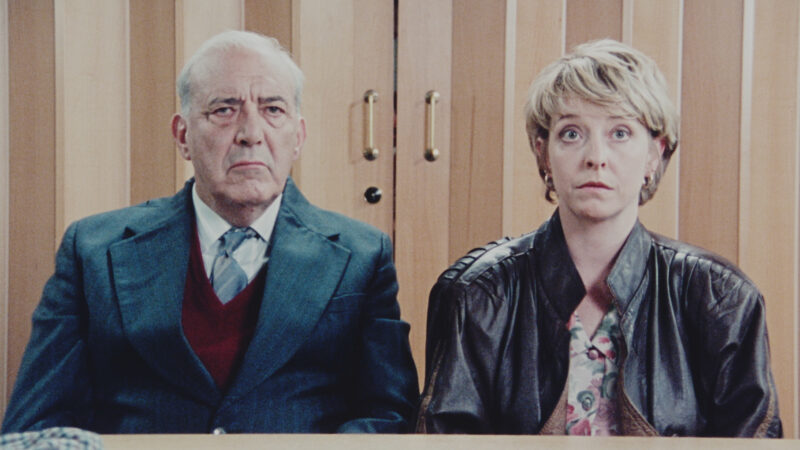
BAFTA Winning Welsh Archive Film ‘Oed Yr Addewid’ Returns to Cinemas
23rd April 2025
A new scan of Oed Yr Addewid (Do Not Go Gentle), a BAFTA winning, politically relevant Welsh language film from 2000 will be re-released in cinemas from March 2025.
From Welsh Director Emlyn Williams, Oed yr Addewid is set in 1997, as Britain reaches a political crossroads following 18 years of Conservative Government rule. The film stars Welsh acting giants, Stewart Jones, Arwel Gruffydd, Gwenno Elis Hodgkins and Gwyn Vaughan. The story follows William Davies, a widower, socialist and retired quarryman, who feels angry and bitter towards a government that has more or less forgotten him in his old age, so he puts a desperate and absurd plan into action. Twenty-five years since its release, the film’s themes of social care, aging and the British state will resonate with audiences today.
Actor Arwel Gruffydd, who plays Alun in the film, reacted to news of the re-release:
“I am very pleased that the Screen and Sound Archive of The National Library of Wales and Film Hub Wales have worked together to create a new digital print of Oed yr Addewid. It was an immense privilege to play a central role in this film 25 years ago, and I have very fond memories of that period, not least of working so closely with the inimitable, late, great Stewart Jones.”
The Screen and Sound Archive of the National Library of Wales and Film Hub Wales, part of the BFI Film Audience Network, have worked together to bring the Welsh classic back to the big screen, which launched at the Llynfi Valley Film Festival at Maesteg Town Hall in March.
The original 35mm film has been re-scanned to 2K quality by R3store Studios, then digitally restored by Gorilla Post Production and prepared for cinema screenings. With the support of Matchbox Cine, English and Welsh descriptive subtitles will also be added for the first time, making the film accessible to a wider audience.
Nia Edwards-Behi, Audiovisual Cataloguer at the Screen and Sound Archive of The National Library of Wales explains:
“We considered a number of films from the archive for this project. We chose Oed yr Addewid because it’s an appealing film that’s also still pertinent in terms of its themes and story. It’s a fine example of an artistic response to the politics of its day, and being able to re-visit that response is so valuable. We’re so fortunate to have an archive full of works like it, and really hope that we’ll see more resources to ensure access to them.”
Hana Lewis, Head of Film Hub Wales adds:
“We work regularly with cinemas and festivals in Wales to increase access to films from the archive’s expansive collection and as part of our Made in Wales project, which celebrates films with Welsh connections. These stories are essential to Welsh on-screen culture, they offer insight into our history and communities, something we are arguably need more of when it comes to films about modern Wales. Unfortunately, there are many barriers that prevent these films being seen regularly, despite audience demand – whether that’s due to lapsed rights, resources to distribute these works effectively, or funds to digitise them and preserve quality. This is why this project is so important. The cost is prohibitive, so as a sector we need to ensure that access to these films is not lost and audiences have a chance to enjoy them for years to come.”
The film is available to cinemas to book for screenings in from late March onwards, with screening dates across Wales to be confirmed.
The project is supported by Film Hub Wales, which is part of the BFI Film Audience Network (FAN) made possible thanks to National Lottery funding, to ensure the greatest choice of cinema is available to everyone across the UK. Funds in Wales are administered by FHW via Chapter as the Film Hub Lead Organisation.
More than £30M is raised each week for good causes across the UK by the National Lottery.

Welsh Films to Watch in 2025
15th January 2025
From the extravagant lifestyle of an eccentric Anglesey Marquess to adventures in the lush landscapes of Laos, eclectic stories with Welsh connections await audiences on the big screen in 2025.
Journey across Wales and beyond this year with local and global stories coming to cinemas, all of which have Welsh connections from locations, to cast and behind the scenes talent. Releasing in spring, Powys-born Joshua Trigg’s debut feature Satu – Year of the Rabbit will transport audiences to Laos as they follow two children on a stunning coming-of-age quest to find their families, friendship and the beauty of everyday life. Set to premiere at Sundance Film Festival 2025 is ie ie Productions’ newest feature film Brides, in which two teenage girls search for freedom, friendship, and belonging when they run away from their lives in the UK with a dangerous plan of travelling to Syria.
Producer Alice Lusher explains how Brides was filmed in Wales as part of an international collaboration:
It was an absolute privilege for us at ie ie productions to work alongside producers Nicky Bentham (Neon Films – UK) and Marica Stocchi (Rosamont – Italy) on Director Nadia Fall and Writer Suhayla El-Bushra’s debut feature BRIDES. A truly international collaboration exploring universal themes of identity and belonging – filmed in Wales, Turkey and Sicily. Production supported local crews and businesses in each country, and it’s been a real pleasure to see their incredible work and talent shine through this beautiful and important film. We can’t wait to share it with the world.
Thrill seeking viewers are in luck as a string of action-packed, psychological dramas and horror films are also set to release. The eagerly awaited Havoc from Welsh director of The Raid Gareth Evans, which was filmed in Cardiff sees Tom Hardy and Forest Whitaker fight their way through a criminal underworld, unravelling corruption and conspiracy along the way. Following this is the mysterious The Man in My Basement starring Willem Dafoe, which is based on Walter Mosley’s novel of the same name. It was filmed in Carmarthenshire, with Welsh producer John Giwa-Amu attached. There are also high hopes for The Scurry, from Welsh director Craig Roberts and Cliff Edge Pictures, which follows the surreal story of two pest controllers who encounter an avalanche of deranged squirrels, wreaking revenge and mayhem on the staff and visitors at an eco-country park.
John Giwa-Amu comments on The Man in My Basement and it’s links to Wales:
It‘s been a great honour for Good Gate to bring such an iconic piece of American culture to film in Wales. We can’t wait for audiences to see this dark and unique thriller come to life.
There are also plenty of films brimming with Welsh heritage. Film Hub Wales is partnering with the National Library of Wales Screen and Sound Archive to re-release a new scan of the 2002 BAFTA-winner Oed yr Addewid. This poignant look at political disillusionment, social care and aging is all the more relevant 25 years after its initial release. A ninety-minute shorts package will also be available from the Archive’s year-long Cymru Anabl (‘Disabled Wales’) project which focused on improving the accessibility of their film and video collections, as well as improving the representation of disabled and Deaf filmmakers in them.
For biography fans, the stories of two iconic Welsh figures hit screens in 2025. Mad as Birds’ new feature film Madfabulous depicts the life of the eccentric Henry Cyril Paget, the 5th Marquess of Anglesey and stars Welsh actor Callum Scott Howells (It’s A Sin) alongside Rupert Everett and Siobhán McSweeney. From Welsh production company Severn Screen, and director Marc Evans, Mr Burton follows the origin story of actor Richard Burton, and stars Welsh talent Aneurin Barnard and Aimee-Ffion Edwards, alongside Toby Jones and Lesley Manville. This is just a snapshot of the films set for release in 2025, with many more to come.
Toki Allison, Made in Wales Project Manager explains how Film Hub Wales’ Made in Wales project supports releases such as these:
Made in Wales aims to fill a gap in the film ecosystem, by creating a bridge between filmmakers and distributors, exploring how that film reaches audiences. Working with Welsh cinemas and festivals, we aim to raise awareness of films with Welsh connections, ensuring that audiences get a chance to see these stories as part of a shared experience in a cinema setting. There’s some special storytelling going on in and around Wales and a unique perspective that deserves to be seen and invested in. Wales is many things and we’re intent on expanding that narrative.
Joedi Langley, Interim Head of Creative Wales, added:
It’s an exciting year for film, with many anticipated titles on the way. Creative Wales is proud to have supported several of these productions, both independently and via the Ffilm Cymru Wales Feature Fund – which in itself has contributed to several recent releases like ‘Chuck Chuck Baby’, ‘The Almond and the Seahorse’ and ‘Timestalker’. The Made in Wales project shines a spotlight on the breadth of filmmaking talent we have here in Wales and gives new features an important platform by raising their profile among audiences and celebrates each one’s Welsh connections and is a project we’re very proud to support. Here’s to a successful year in film for Wales in 2025.
Film Hub Wales’ Made in Wales (MIW) project celebrates films with Welsh connections. It offers a host of year-round activities in partnership with Welsh exhibitors, including a film catalogue, which hosts information on over 1000 shorts and feature films. Audiences can keep up to date with news of upcoming Welsh releases and the latest interviews by following Made in Wales on Instagram, Facebook, TikTok, the Made in Wales podcast, YouTube and Letterboxd.
MIW is made possible thanks to funding from Creative Wales and the BFI Film Audience Network (FAN), awarding funds from the National Lottery. BFI FAN offers support to exhibitors across the whole of the UK, to boost cultural programming and engage diverse audiences. In Wales, activity is led by Film Hub Wales, managed by Chapter.
– ENDS –
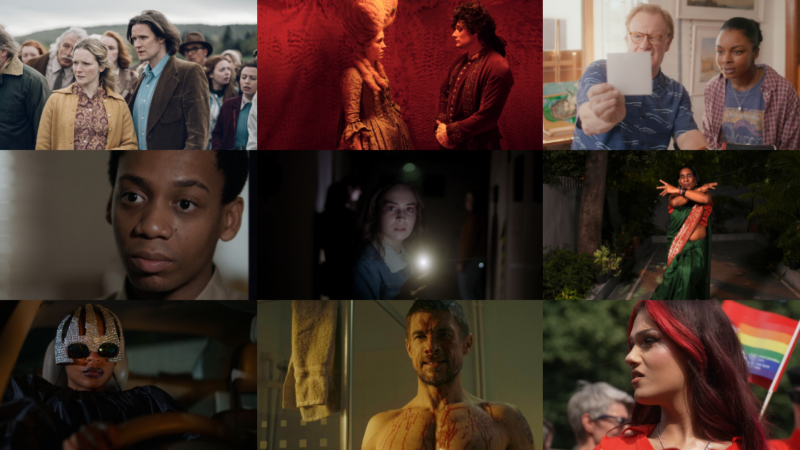
Welsh Films Screening in Cinemas this Winter
9th October 2024
If you’re looking to fill your calendar with Welsh films this winter and settle into a cosy cinema seat, in front of the big screen, we have the list for you.
It’s already been a busy year for films with Welsh connections in 2024 with dramatic features such as The Almond and the Seahorse, Unicorns and Chuck Chuck Baby, plus the epic animation; Kensuke’s Kingdom, all of which had special Made in Wales interviews to introduce audiences to the Welsh links.
We have even more to look forward to, starting with Timestalker, which releases October 11th. Director Alice Lowe creates a karmic, hilarious and sometimes violent journey that sees the hapless heroine Agnes reincarnated every time she makes the same mistake: falling in love with the wrong man. The film has a host of Welsh connections from producer Vaughan Sivell to actor Aneurin Barnard, who Made in Wales interviewed this week. It was also filmed in Cardiff and Penpont House in Brecon.
Welsh Producer Vaughan Sivell explains:
Since my first film, Third Star, we’ve managed to shoot many of our films in part at home in Wales but in this case, we managed to shoot the entirety of Timestalker there. We doubled the Brecon Beacons as the Scottish Highlands, Penpont House as Georgian England and Cardiff Bay as 1980’s New York! The Welsh crew were outstanding and we had an amazing time. I can’t wait for local audiences to see it on the big screen.
Moving on to November, we have two documentaries with globally significant themes. First up is India’s 1st Best Trans Model Agency, from Pembrokeshire based director Ila Mehrotra, releasing November 11th during Transgender Awareness Week. This emotionally charged journey, filmed over seven years, follows the extraordinary story of Rudrani Chettri, her friends and the transgender community of Delhi as they create India’s first ever trans modelling agency. The film explores the complex world of India’s ‘third gender’ (Hijra), where traditional values clash with human rights. The film brings identifiable stories of love and loss, hope and poverty, beauty, glamour and catwalk glory.
On November 22nd, the multi award winning O R Tambo’s Comrade Tambo’s London Recruits will be launched to a wider cinema going public via what the organisers are calling a ‘People’s Release’. The film, hailed by Variety as an ‘edge of your seats documentary thriller‘, is set at the height of apartheid in the late sixties / early seventies as a group of working-class, anti-racist activists living in London answer Oliver Tambo’s secret call for undercover agents to bring hope to his embattled people inside South Africa. The release is being organised in partnership with the Trade Union movement and solidarity with Southern Africa organisation, ACTSA, in response to nationwide race riots across the UK. A key component will be post-screening panel discussions on how we can all contribute to an anti-racist Britain.
Welsh Director Gordon Main explains why releases like Comrade Tambo’s London Recruits are so significant:
With an emboldened far right once more on our streets, this film offers a powerful, anti-racist alternative to hate. The London Recruits risked their liberty for a better world. They are an inspiration. Shot in Wales and South Africa, the film is a proud Cymru / South Africa collaboration. It’s a showcase for great talent and locations in both countries and is part of a wider cultural and artistic dialogue that sees Welsh / African creative partnerships as vital for a culturally healthy, outward looking, international Wales.
Also highly anticipated is the second feature from Zambian Welsh Director Rungano Nyoni: On Becoming a Guinea Fowl. The film follows Shula as she drives on an empty road in the middle of the night, stumbling across the body of her beloved uncle Fred. As funeral proceedings begin around them, she and her cousins bring to light the buried secrets of their middle-class Zambian family. Keep your eye out for the release date, coming soon.
Fans of all things gory, can also look out for ambitious low-budget slasher film Scopohobia from Welsh director and writer Aled Owen this autumn, as well as Protein about a gym obsessed serial killer, coming soon from a team of Welsh producers Craig Russell, Tom Gripper and Dan Bailey. Both films were made in and around Swansea. Audiences can still also catch screenings of creepy British folk horror, Starve Acre, starring Welsh actors Morfydd Clark and Erin Richards.
Hana Lewis, Film Hub Wales’ Manager on how the Made in Wales project will support these releases:
Through our Made in Wales project, we work closely with the rightsholders to promote each release, creating assets such as interviews with talent and editorial articles which showcase Welsh elements such as themes or locations, of which audiences might otherwise not be aware. It’s essential that these films reach communities in cinema environments as they help us to see Wales on screen and the world to see us. We can explore our cultural identity in new ways, giving voice to diverse storytellers and challenging stereotypical perceptions of Wales.
Film Hub Wales’ Made in Wales (MIW) project celebrates films with Welsh connections. It offers a host of year-round activities in partnership with Welsh exhibitors, including a film catalogue, which hosts information on over 1000 shorts and feature films and Made in Wales podcast. Audiences can keep up to date with news of upcoming Welsh releases and the latest interviews by following @Madeinwales_ on social media.
MIW is made possible thanks to funding from Creative Wales and the BFI Film Audience Network (FAN), awarding funds from the National Lottery. BFI FAN offers support to exhibitors across the whole of the UK, to boost cultural programming and engage diverse audiences. In Wales, activity is led by Film Hub Wales, managed by Chapter.
– ENDS –

BFI announces ART OF ACTION, a major UK-wide season celebrating the artistry of real action choreography
29th July 2024
The season will be presented by the BFI Film Audience Network at venues UK-wide from October-December 2024, with highlights including:
- BFI Distribution re-release of Kathryn Bigelow’s POINT BREAK (1991), in cinemas UK-wide on 8 November
- UK-wide screenings and events presented in partnership with the BFI Film Audience Network, including the ninth edition of the Fighting Spirit Film Festival, a celebration of women of colour working in action cinema and screenings dedicated to the ‘original Hollywood action hero’ Buster Keaton
- Major season at BFI Southbank and BFI IMAX featuring focuses on John Woo and Bollywood action
- BFI 4K UHD release of SEVEN SAMURAI on 21 October, with screenings at selected cinemas from 27 September, including a premiere event at BFI IMAX on 26 September
- A collection of films to stream on demand on BFI Player
The BFI today announces a new season celebrating the artistry of real action choreography, that has kept film audiences on the edge of their seats since the early days of cinema. Presented by the BFI Film Audience Network (BFI FAN) using funds from the National Lottery, ART OF ACTION will take place at cinemas across the UK from October-December 2024, with the chance to get behind-the-scenes insights from those working in the action and stunt communities, via special events, demonstrations, talks and screenings throughout the season. ART OF ACTION will spotlight the genre through the ages, with films ranging from cult classics to lesser-known gems from around the world. It will illuminate the work of female stunt performers and their struggle for recognition, and champion the new wave of action stars and filmmakers who are building upon the legacy of those who have fallen, crashed, smashed and picked themselves up before them.
From the jaw-dropping stunts of the silent era to the intricate dynamic choreography of today’s biggest action films, via the daredevil ethos of Hong Kong filmmaking, ART OF ACTION will feature screenings of THE GENERAL (1926), THE TRAIN (1964), THE WILD BUNCH (1969), the POLICE STORY TRILOGY (1985-1992), RUN LOLA RUN (1998), CROUCHING TIGER, HIDDEN DRAGON (2000), POLITE SOCIETY (2023) and many more. The centrepiece of ART OF ACTION will be a BFI re-release of Kathryn Bigelow’s POINT BREAK (1991) starring Keanu Reeves as FBI agent Johnny Utah, who goes undercover with a gang of surfers, led by Patrick Swayze’s Bodhi, who are suspects in a series of bank robberies. Bigelow’s kinetic masterpiece, which has rarely been seen on big screens in the UK in recent years, will be released in selected cinemas UK-wide by BFI Distribution on 8 November, with the film also available on BFI Player on the same date.
Timon Singh, BFI FAN Producer and programmer of ART OF ACTION, said:
After the triumph of EVERYTHING EVERYWHERE ALL AT ONCE and the continued success of franchises like JOHN WICK and MISSION: IMPOSSIBLE, it’s clear that the thrill of watching ‘real action’ done by stunt performers, as well as stars like Michelle Yeoh and Tom Cruise, still captivates audiences. This season looks at the cinematic artistry, skills and craft involved in creating iconic action sequences and films, as well as engage with the historic roots and cross-cultural influences of the genre. We’ll celebrate the skill and daring of actors and stunt performers and their extraordinary on-screen exploits and provide opportunities to get behind-the-scenes insights into the daring world of action design which will thrill and entertain, and hopefully inspire the next generation of creatives.
Jason Wood, BFI Director of Public Programme & Audiences, said:
Art of Action will be a high-octane crowd pleaser at a moment when we truly need to be supporting cinemas, which provide such vital culture and entertainment to communities across the UK. The BFI Film Audience Network plays a really important role in getting diverse films to audiences and this has been an inspirational and creative collaboration with our colleagues at Watershed, Bristol taking the lead. It’s a greatblueprint for how the BFI can work with partners UK-wide on major projects. Art of Action’s broad historical and international scope presents the films we love alongside brand-new discoveries from silent gems to combat charged women, martial arts to major blockbusters plus a long-awaited re-release of Kathryn Bigelow’s seminal Point Break. Buckle up and enjoy the ride!
The season will be programmed around three key themes, with the first dedicated to spotlighting action through the ages – from the early visual gags of silent gems like THE GENERAL (1926) to influential classics such as THE ADVENTURES OF ROBIN HOOD (1938) and THE TRAIN (1964), through to the intricate and dynamic wuxia choreography of CROUCHING TIGER, HIDDEN DRAGON (2000). ART OF ACTION will also bust the myth that action is just by and for men; celebrating the plethora of female talent in front of and behind the camera, as well as shedding a light on under-represented voices in the action community, from YES MADAM (1985) to POLITE SOCIETY (2023) via RUN LOLA RUN (1998). Finally, the season will explore how action films became a global phenomenon as both Eastern and Western filmmakers were inspired by each other, and the impact of such cross-cultural influences on cinema today – from SEVEN SAMURAI (1954) and THE WILD BUNCH (1969) to the POLICE STORY TRILOGY (1985-1992).
More than 50 venues UK-wide will host events and screenings supported by the BFI Film Audience Network, with some of the highlights set to include:
- Broadway Cinema’s action mini season designed for Under-25s and marginalised audiences, which will include a day of Robin Hood screenings to mark Nottingham’s Robin Hood Marathon.
- Call to Action, a programme curated by Reclaim the Frame that centres women of colour working in front of and behind the camera in the action genre, from the 90s to the present day. Comprising special events with guests including stunt performer Ayesha Hussian, panel conversations, demos and screenings, Call to Action will tour venues including Hackney Picturehouse, Dukes at Komedia, Picturehouse (Brighton), Glasgow Film Theatre and Midlands Art Centre (Birmingham).
- Cromarty Kicks Ass, a tightly packed season of films run by Cromarty Community Cinema in the Highlands, Scotland, will address themes of justice, revenge, honour and the global desire to have the cinema shake with action, alongside parkour and capoeira demonstrations and workshops, and a free outdoor screening of a Jackie Chan classic accompanied by a live musician and torchlight lion dance.
- Exeter Phoenix: Smash The Glass, which will celebrate the women who have advanced action cinema both on and off-screen, delivered in partnership with Girls on Film critic and broadcaster Anna Smith, with collaborations from Plymouth Art Cinema.
- Fabrica in Brighton will deliver Creative Action, a weekend-long festival empowering young people aged 16-25, women and people of marginalized genders by repositioning the cultural significance of action films for audiences. The festival will engage these groups through partnerships with women, non-binary and queer-friendly martial arts clubs, a programme of shorts from local and international animators and a collaboration with their young film programmers’ group, Fresh Perspectives.
- The ninth edition of Fighting Spirit Film Festival, with martial arts shorts and features presented alongside martial arts and weapons demonstrations, a martial arts workshop and seminars on choreographing a short action sequence.
- Hyde Park Picture House Leeds’s programme exploring the history of car races and chases in global cinema, featuring talks and Q&As with academics, car enthusiasts and stuntwomen, plus a day-long educational session as part of Hyde Park Picture House’s Film School strand.
- The Magic Lantern screening POINT BREAK alongside the local surf community in Tywyn with entertainment including a live band and a party; THE GENERAL with live musical accompaniment and trips on the Talyllyn steam railway; martial arts demos, a free sword fighting workshop and Welsh filmmaker Garth Evans’ RAID II.
- MilkTea’s ESEA In Action, at Brixton Ritzy in London and City Screen in York, which will showcase a program of East and Southeast Asian (ESEA) cinema with their programme theme, Black x Asian cultural crossover, in partnership with Dark Matter.
- Mitchell Arts Centre’s celebration of the ‘original Hollywood action hero’, Buster Keaton, with enhanced screenings featuring live musical accompaniment from musician Meg Morley and an introduction from local film historian Ray Johnson.
- Queen’s Film Theatre Belfast’s programme spanning the breadth of the genre with special events including a celebration of women in action with film journalist Helen O’Hara, a stage combat demonstration by fight director Philip Rafferty, and an action all-nighter curated by QFT’s LUMI programmers.
The full UK-wide line-up of screenings, events and touring programmes will be announced soon.
BFI Southbank will play host to a major season from 21 October – 30 November, concentrating on several themes alongside stunts; the women of action, the master John Woo and the influence of Bollywood, as well as serving a plotted guide through the history of action cinema with a special all action-themed edition of Big Screen Classics, where BFI Southbank shows classic films on a daily basis for just £9. Special events confirmed for the season so far include Stunt Saturday on 16 November, a special day of talks, panel events, screenings and workshops all celebrating the art of stunts. BFI Southbank will welcome Nida Manzoor for a Q&A on 17 November, following a screening of her hilarious and exhilarating action/comedy POLITE SOCIETY (2023), which follows 16-year-old Ria, an aspiring stuntwoman, who is alarmed when her sister Lena is swept up by a charming suitor and starts heading towards marriage at speed. Also on 17 November, The Art of the Action Trailer will present some of the best and worst action trailers through time, pondering the iconic trailer voiceover and decide whether it’s better to reveal or conceal the big stunts.
BFI IMAX, the UK’s largest screen, is one of the best places to watch an action blockbuster with its immersive, unmatched scale. The cinema will host a number of events during the season, including all-nighters dedicated to JOHN WICK and MISSION: IMPOSSIBLE, and the premiere of a new 4K restoration of Akira Kurosawa’s SEVEN SAMURAI (1954) on 26 September. SEVEN SAMURAI will also be released by the BFI on 4K UHD on 21 October, with the new restoration playing in further selected cinemas as part of the season. More information about the 4K UHD release will be revealed soon.
Audiences will also be able to stream films from the season at home on BFI Player, with a selection of titles set to include FIST OF FURY (1972), THE STREET FIGHTER (1974), ARMOUR OF GOD (1986), HEROES SHED NO TEARS (1986), POINT BREAK (1991), RUN LOLA RUN (1998), LEONOR WILL NEVER DIE (2022) and many more to be announced soon.
Ends.

What’s on in Welsh Cinemas: Affordable Films for Communities across Wales
23rd July 2024
Film Hub Wales (FHW) has awarded over £100,000 of BFI National Lottery funding to nineteen independent Welsh cinemas and film festivals, through its Film Exhibition Fund.
Funds will enable Welsh audiences to watch the latest UK independent and international films in their local communities, at affordable prices. From relaxed, family friendly films to eco cinema strands and the latest Welsh releases, there’s plenty to choose from.
Audiences in Bridgend and Blaenau Ffestiniog will even get to watch the films in exciting new cinema spaces. Awen Cultural Trust is launching its Llynfi Valley Cinema Project alongside at Maesteg Town Hall following its multi-million-pound redevelopment. At Cellb, their new ‘Sgrin Emyr Ankst’, opens in memory of Welsh music and cinema pioneer Emyr Glyn Williams – his legacy is set to inspire the young people of Wales for many years to come.
Rhys Roberts from Cellb explains the importance of their new screen to the community:
Cellb is located in the center of the town of Blaenau Ffestiniog, a high mountainous location under the Stiniog quarries with its rich past history in industry, heritage and culture. It was the location for the first ever Welsh language film, Y Chwarelwr, an important film that reflects the lives of the local quarrymen in its community. Its past historic Culture and Welsh language was a vital part of the social and cultural dynamics.
Today, we feel that it’s important to celebrate and to educate our young people about modern heroes such as Emyr and it is with this in mind that we wish to dedicate our Screen 1 to his name. Our youths need role models, whom have flourished in the arts and culture and Emyr is a fine example of a local boy who dreamt big and made a huge impact on Welsh Culture. This is for you Emyr, you have inspired us and we will shine your beacon on to the masses for years to come. Diolch Emyr, Caru chdi.
At the Torch Theatre in Milford Haven, they’re building relationships with their audiences and local partners, exploring global themes of intersectional identity through their film programme. They’re opening up the space to new communities by celebrating important awareness dates such as Black History Month, LGBTQIA+ History Month and the International Day of Persons with Disabilities.
Chelsey Gillard, The Torch’s Artistic Director explains:
We are thrilled to work with Film Hub Wales to deliver a series of celebratory cinema seasons across six months. This funding will allow us to build relationships with our communities and discover what people want to see at their local cinema, informing our long-term sustainability. By working with partners across Wales that bring a wealth of lived experiences, we will be able to screen a wider variety of films and facilitate post-screening events that we hope will support discussion, reflection and connection.
Other highlights include youth-led activities at Taliesin Arts Centre in Swansea and Theatr Gwaun in Fishguard, works screened from neurodivergent filmmakers at both Hijinx Unity Festival and through Cardiff Animation Festival’s Different Voices strand, as well as a nature/ecology in horror strand at Abertoir International Horror Festival – think disgusting real-life parasites and ‘nature fights back’.
Hana Lewis, Head of Film Hub Wales adds:
The fund is designed to help cinemas, festivals and community screens to bring the best UK independent and international films to Welsh audiences, in accessible and affordable ways. There’s so much to look forward to this year, which communities simply can’t get from watching a film at home. By heading out to their local cinema space, they’re already part of something bigger within their community and with a host of activities on offer, audiences get a night out for the price of their ticket.
The projects are supported by Film Hub Wales, which is part of the BFI Film Audience Network (FAN) using funds from the National Lottery to ensure the greatest choice of cinema is available to everyone across the UK. Funds in Wales are administered by FHW via Chapter as the Film Hub Lead Organisation.
More than £30M is raised each week for good causes across the UK by the National Lottery.
Ends.

Spotlight programme announced by BFI FAN
The programme will see investment in eight local areas across the UK to boost audience choice and improve access to screenings of independent film.
Announced today as part of the latest iteration of BFI Film Audience Network (FAN), SPOTLIGHT sees additional BFI National Lottery investment in eight local areas across the UK to boost audience choice and improve access to screenings of independent film. In addition, each FAN Hub now also has funding available – totalling over £750,000 – to support a wide range of exhibition activity across the UK, and Network is also rolling out significant skills programmes to upskill exhibition professionals. This comes as an external evaluation of BFI FAN is published, highlighting its success in reaching new audiences and broadening access to screen culture.
For BFI FAN 2023 to 2026, the BFI ringfenced £1.85 million National Lottery funding for SPOTLIGHT. It takes a hyper-local approach to developing screenings in eight areas, each identified as having little or no screening provision by their local Film Hubs. The projects will be delivered over three years, in many cases operating in partnership with locally based film organisations, with an end goal of establishing audiences and screening activities that can be sustained and continue once this targeted support ends.
The SPOTLIGHT areas and the partners set to receive support are:
- Film Hub London: Barking & Dagenham and Newham
- Film Hub Midlands: Stoke on Trent and Stafford, in partnership with Flatpack Festival
- Film Hub Northern Ireland: Newry & Mourne, in partnership with Newcastle Community Cinema
- Film Hub North: Sunderland, in partnership with Sunderland Shorts Film Festival
- Film Hub Scotland: Moray Firth area, in partnership with Eden Court, Inverness
- Film Hub South East: Peterborough, in partnership with the Gateway Film Festival
- Film Hub South West: Swindon, in partnership with Create Studios
- Film Hub Wales: Rural Conwy, in partnership with TAPE, Community Music & Film
Ben Luxford, BFI’s Director of UK Audiences says:
The aim of BFI FAN has always been to open up access and opportunity for everyone across the UK to be able to discover and watch a rich variety of UK and international indie film. Given the ongoing challenges the exhibition sector is facing, the value of FAN, particularly the financial support and training it offers, is more vital than ever. The latest FAN evaluation outlines where it has had a positive impact and helped us set the roadmap for this latest iteration – it tells us that having a connected national network which has a localised approach is key to its success. In introducing SPOTLIGHT we want to encourage ultra-local audience development, focussing on a specific area that is underserved and enable the Hubs to take action to improve the offer and engage the local community. As well as benefit to those audiences, we also hope the whole of FAN will gather learnings to make longer-term impact.
Also rolling out in 2024 are a series of BFI FAN skills and development initiatives intended to provide Hub members with access to vital training and learning opportunities. These include REACH: Strategic Audience Development training which has been created by the ICO and run for four previous editions. This intensive course will give its participants an opportunity to build their expertise in growing and developing audiences and is soon to be followed by a new course – Revisiting Your Cinema Business Model – intended to address the pressing need for greater financial and commercial knowledge within cinemas across the UK.
A regular programme of online webinars is also being offered to FAN members across the UK covering a range of topics including environmental sustainability, access, working with young audiences and screen heritage. Later this year will also see the launch of a new BFI FAN Conference, bringing member organisations together to share best practice in reaching audiences with innovative film programmes and develop a more connected community of peers within the Network.
These initiatives come as BFI FAN published an evaluation of its activity between 2018 and 2022 undertaken by Indigo Ltd. The report highlights the success of the decentralised funding model that saw an £8 million investment support over 2,428 projects that added an estimated value of at least £21.2 million to the economy. FAN exceeded its ambitious audience targets, with supported activity achieving almost 2.3 million admissions from 1,514 audience facing projects.
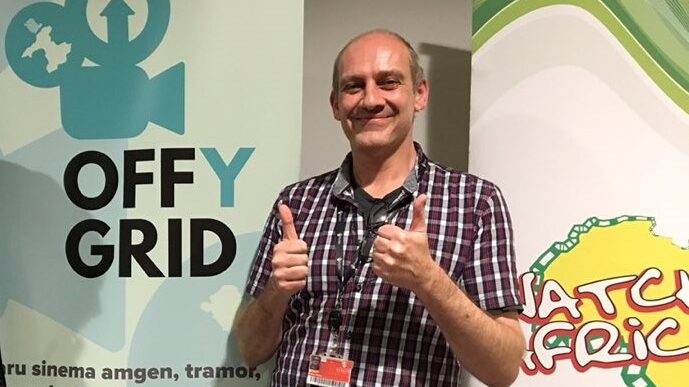
A Tribute to Emyr Glyn Williams
We are devastated by the loss of our friend and colleague, Emyr.
We were fortunate to have worked with him over the last ten years, since the start of his journey at Pontio. He called us in excitement to chat about programming the cinema, before the building had even opened. He was a constant collaborator from that point onwards, someone who supported us, as much as we hopefully did him. He inspired the idea of the ‘Off y Grid’ project because he felt the loneliness of running a venue at times and wanted to create partnerships with neighbouring cinemas.
He was the kind of person that would meet you with open arms and hug you like he meant it. You could talk to him for hours (and we did sometimes) about films or creative ideas. He was someone that we could approach for any project idea and know he’d come up with something spot on. A brilliant champion of Welsh language and culture and font of knowledge when it came to Welsh film.
We only shared a small part of Emyr’s life and are grateful for that. We send our love and deepest condolences to his family, friends and his colleagues at Pontio and beyond.
Emyr often found himself quoted all over our site because he had a beautiful way with words. You’ll find him as a permanent fixture on our home page, where he summed it up in six words: ‘cinema belongs to all of us.’ We’ll miss you Emyr. We know you’ll already have the lights down low and a projector running up there.
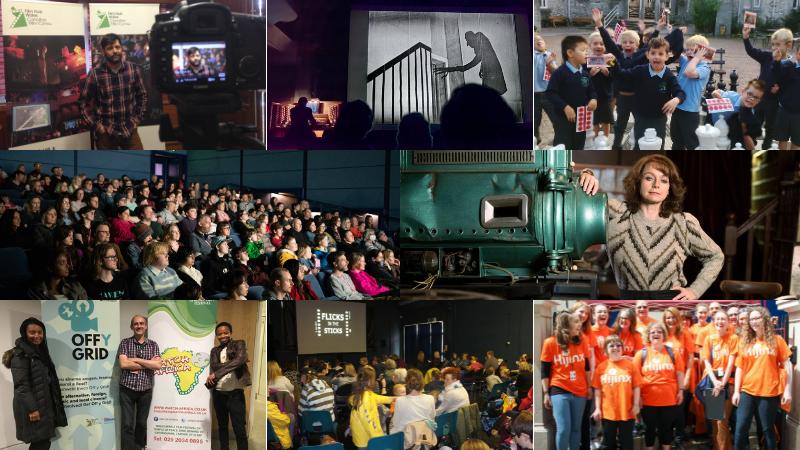
Welsh Cinemas Celebrate Film Hub Wales’ 10th Anniversary
It’s our tenth Birthday! We’re looking back to this time in 2013, when we launched a significant new programme in partnership with Welsh cinemas, film festivals and community screens, designed to build audiences for British independent and international film across Wales.
This has all been made possible thanks our partners in exhibition and across BFI FAN, with funding from The National Lottery via the BFI. Join us for a look back at just a fraction of what we’ve achieved together over the last decade.
Watch video messages from our members below, along with a special ten year video edit, plus our press release, ten year highlights and social stories:
